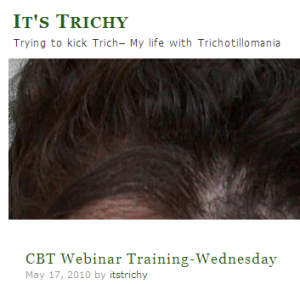I came across a blog called It’s Trichy. It’s written by a person who suffers from trichotillomania. On one of the pages, the author talks about things she’s tried to resist the urge to stop pulling hair out.
I thought her comments provided a perfect example of how Amino Acid Therapy (AAT) can really help establish a proper neurotransmitter balance, which then allows Cognitive Behavioral Therapy (CBT) to be much more effective.
It’s Trichy writes that she has “a really hard time initiating the thought restating process as well as the other techniques (involved in CBT). I kind of get stuck with a feud in my head between wanting to give into the urge and wanting to resist. I haven’t been very successful getting out of that inner battle to really put the CBT techniques into place.”
“Since a lot of the work is done as ‘homework’ outside of the session, I find that my laziness gets in the way. It’s a lot less uncomfortable to just pull and deal with the frustration, than it is to resist the urges long term. I’m going to keep working on this one, but I need to find something that really gets me motivated enough to remember that I have techniques to put into place when I need them.”
Why trichotillomania trumps willpower
Without AAT, the author is trying to use ‘will-power’ solely to overcome her urges. If she were to establish the proper neurotransmitter balance, we could help her eliminate the urges. This would free her to focus on her ‘homework’ and implementing the CBT techniques and help her stop pulling hair out.
Think of all the energy she has to exert to wage the ‘inner battle’ she describes. If we can eliminate the urges, that frees her from needing to resist them and/or give into them, which takes a lot of mental energy, causing a great deal of frustration and often, guilt.
In addition, proper NT balance helps with other issues related to NT balance, including depression, motivation, focus, concentration and memory – many of which she (and many trich suffers) deal with, either knowingly or unconsciously.
Therefore, by going after the underlying root cause (or at the very least, one of them) of neurotransmitter imbalance, we can successfully address many of the symptoms/disorders a person is experiencing.
Why medication won’t help stop pulling hair out
It’s Trichy noted several other methods she used to try and stop pulling hair out, including SSRI medications. She noted that she suffers from depression, and has been taking medication since middle school.
The SSRI medications most likely helped with the symptoms of depression for a while because there was probably a low amount of serotonin to work with. Over time, however, these medications will cause further depletion of neurotransmitters, making the drugs appear to ‘no longer work’.
At this time, most physicians will simply try a higher dose of the current medication or switch medications. Unfortunately, this just perpetuates the cycle of imbalance.
Switching to an SNRI (selective norepinephrine reuptake inhibitor) will work on the excitatory neurotransmitters, such as dopamine and norepinephrine. In addition to controlling the flow of information between neurons, these neurotransmitters elicit effects on the ‘pleasure centers’ of the brain and can also impact focus, concentration and motivation.
This explains why she became aware how “much I really do enjoy pulling”. However, these drugs will also cause depletion of neurotransmitters and will eventually stop being effective.
The worst part about taking these medications over a prolonged period of time is that the NT depletion and imbalances they cause can make people feel worse if/when they discontinue them than before they started on the medication, which leaves people feeling stuck.
Luckily, using professionally guided amino acid therapy is an extremely effective way to quickly regain proper neurotransmitter balance. This will eliminate the symptoms, and will ultimately help you stop pulling hair out.


